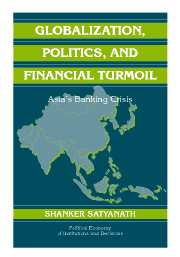Book contents
- Frontmatter
- Contents
- Figures and Tables
- Preface
- GLOBALIZATION, POLITICS, AND FINANCIAL TURMOIL
- 1 Introduction
- 2 Bank Regulation in the Debate over Capital Flow Liberalization
- 3 The Signaling Argument
- 4 Incredible Signaling in Democracies: The Cases of Thailand, South Korea, and the Philippines
- 5 Unorthodox Solutions to the Signaling Problem: The Cases of Malaysia and Indonesia
- 6 Orthodox Solutions to the Signaling Problem: The Cases of Singapore and Hong Kong
- 7 Some Concluding Remarks
- Appendix I The World Bank's Evaluation of Bank Regulatory Environments
- Appendix II Verbal Description of the Equilibrium with Two Signalers
- Appendix III Formal Proof of Equilibrium with Two Signalers
- Bibliography
- Interviews by the Author
- Index
- POLITICAL ECONOMY OF INSTITUTIONS AND DECISIONS
7 - Some Concluding Remarks
Published online by Cambridge University Press: 24 July 2009
- Frontmatter
- Contents
- Figures and Tables
- Preface
- GLOBALIZATION, POLITICS, AND FINANCIAL TURMOIL
- 1 Introduction
- 2 Bank Regulation in the Debate over Capital Flow Liberalization
- 3 The Signaling Argument
- 4 Incredible Signaling in Democracies: The Cases of Thailand, South Korea, and the Philippines
- 5 Unorthodox Solutions to the Signaling Problem: The Cases of Malaysia and Indonesia
- 6 Orthodox Solutions to the Signaling Problem: The Cases of Singapore and Hong Kong
- 7 Some Concluding Remarks
- Appendix I The World Bank's Evaluation of Bank Regulatory Environments
- Appendix II Verbal Description of the Equilibrium with Two Signalers
- Appendix III Formal Proof of Equilibrium with Two Signalers
- Bibliography
- Interviews by the Author
- Index
- POLITICAL ECONOMY OF INSTITUTIONS AND DECISIONS
Summary
This concluding chapter is divided into two sections. In the opening section, I summarize my results and address some of the implications and limitations of my analysis. In Section 7.2, I describe my agenda for future research.
SUMMARY OF RESULTS, IMPLICATIONS, AND LIMITATIONS OF ANALYSIS
In this book, I have attempted to advance the debate over capital flow liberalization in the developing world by studying the determinants of lax bank regulation under liberal capital flows. Aside from cronyism and gridlock, which have previously been identified, I identified a third causal path to lax regulation, namely, the path of incredible signaling. I showed that if a chief executive does not have the freedom to appoint an official who shares his preferences as a signaler of confidential bank regulatory information, the outcome will be an incredible long-term commitment to stringent bank regulation. Using the tools of game theory, I showed that the difference in preferences between a signaler and the chief executive that results in serious miscommunication is very small in the realm of bank regulation. I showed that miscommunication results in an incredible commitment to stringent regulation even in the presence of a chief executive who does not have close ties to bankers, by causing the chief executive to miscalculate his responses to shocks to the banking sector.
I then identified ways to solve signaling problems, such as appointing friends or close associates who share the chief executive's regulatory priorities to senior financial positions.
- Type
- Chapter
- Information
- Globalization, Politics, and Financial TurmoilAsia's Banking Crisis, pp. 130 - 134Publisher: Cambridge University PressPrint publication year: 2005

